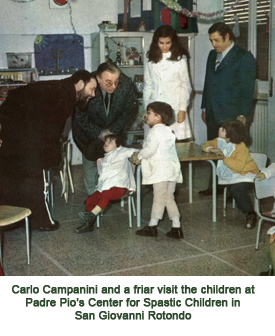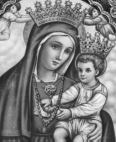Brothers and sisters, we are ambassadors for Christ,
as if God were pleading through us. We implore you on behalf of Christ,
be reconciled to God. . .For he says, ‘In an acceptable time I heard you,
and on the day of salvation I helped you.’ Behold, now is a very
acceptable time; behold, now is the day of salvation.
– 2 Corinthians 5:20,6:2
The Conversion of Carlo Campanini
 Carlo Campanini took several detours on his journey back to God. When he met his spiritual father, Padre Pio, he began to see the right direction for his life. Padre Pio lead him with wisdom, love and sometimes humor. The following is his story.
Carlo Campanini took several detours on his journey back to God. When he met his spiritual father, Padre Pio, he began to see the right direction for his life. Padre Pio lead him with wisdom, love and sometimes humor. The following is his story.
My conversion experience took place in 1950, but Padre Pio had patiently kept his eye on me for eleven years. When I visited him for the first time in 1939, I did so for selfish reasons. I thought he was some kind of magician or fortune teller, and I hoped to make some money by visiting him. As an actor, I toured the world. It was a hard life. I traveled all year long and lived like a gypsy. I was married and had three children. Since the work I was doing didn’t allow me to have a permanent residence, no one wanted to rent me a house. My wife worked with me, and we had to leave our children with a sister-in-law.
This kind of lifestyle was hard on me. I really wanted to find a job that would allow me to be with my children. I came from a very poor family and only went to school until the sixth grade. All that time I was in a school run by the Christian Brothers, and we were forced to go to Mass every morning before classes. This bothered me so much that I never set foot in a church again after I left school.
One day in 1939, when I was talking to a colleague, Mario Amendola, I told him, “Once it was easy to believe in God. There were great saints like St. Francis, St. Anthony, and St. John Bosco, who performed miracles. Saints no longer exist, and there aren’t miracles anymore.” Amendola told me that it wasn’t true. “There’s a holy monk in Puglia who does extraordinary things,” he said. Amendola told me about an incident that had happened to his cousin a few years before.
“He was poor and out of work. Just to do something, he volunteered to fight in the civil war in Spain. When he returned, his wife told him, “If you’ve made it back alive, it’s because Padre Pio prayed for you. I made a vow to him that you would go and thank him.’ My cousin went to San Giovanni Rotondo and told Padre Pio about his difficult situation. Padre Pio gave him some very precise direction, “Go to Falconara.”
“I can’t,” my cousin answered. “At least I have friends in Rome who’ll help me. I’d die of hunger in Falconara.” “Go to Falconara,” Padre Pio repeated. My cousin moved there with his wife and children. He found his mother there. A few months before, she had left Rome so that she wouldn’t be a burden on him. Now she was trying to survive by begging outside the door of the church. Together, they went through two months of incredibly hard times.
One morning a man came from Ancona looking for my cousin. He said to him, “I’m here on an assignment for the head of a union. He would like to see you tomorrow morning at his office.” My cousin went to his office, and was offered a contract on the spot for three thousand lire a month. At that time people felt they were living well when they made one thousand lire a month.
Amendola’s cousin’s experience made a deep impression on me. It also made me think.
During Holy Week, I was in Bari with a theater company. They gave us two days off. “San Giovanni Rotondo is somewhere around here,” I told Amendola. “Why don’t we visit that holy monk?”
We left on Thursday morning. San Giovanni Rotondo was poor and almost deserted. We looked for Padre Pio’s church. “He can’t see you,” we were told. “His wounds are very painful. Even though they usually bleed all year long, during Holy Week they leave him in a pitiful state. For this reason he is unable to see anyone.” Nonetheless, we protested, “But we’re actors. We’ve come from far away. We only have these two days free. We have to see him.”
We decided to stay and walk around the monastery, hoping to run into Padre Pio. Since I was rather frivolous and could only think about making people laugh, I was even cracking jokes in the monastery. That Thursday afternoon, while Amendola and I were making a lot of noise, a friar who looked like a giant walked out of the church and complained, “So, you won’t even let me pray these days. What do you want?” (It was Padre Pio.)
“Father, we’re two poor actors.”
“We’re all poor,” he replied.
“We want to go to confession to you,” I added, trying to justify our presence. “Go prepare yourselves,” Padre Pio replied. “I’ll hear your confession tomorrow morning after Mass.”
I remember that Mass as being a nightmare. It never ended. I had to stay on my knees the whole time. Otherwise those behind me couldn’t see. The pain from kneeling was unbearable. When Mass was over, I went to confession. Padre Pio wouldn’t let me speak. Yet he knew everything about me. He made me promise that I would change my life, and then gave me absolution. I didn’t have the courage to ask him for anything. But inside me I kept repeating to myself, “Father, help me to find a job near home, even as a shopkeeper, so that I might live together with my children.”
I went back to Bari and then I went to Rome. They were beginning to make a new film, Addio Giovinezza. There were four famous actors who were candidates for the role of Leone in that film. I was totally unknown in those circles, but for some reason that I’ll never figure out, the part was given to me. But that wasn’t the end of it. Since that time I’ve made 106 films, one after another. Now I’m rich and famous. I was able to buy a house and live with my children, just as I had wanted.
I was leading a dissolute life. I was involved in illicit relationships. I wasn’t going to Mass, and I didn’t want to hear anything about prayer. Yet, I felt guilty. Padre Pio had answered my prayer, but I had deceived him. For this reason, I didn’t want to go back to see him.
This was the situation I was in at the end of 1949. I was at the height of my fame. I had a custom-made American car. Newspapers wrote extensively about me because I was appearing in every film. I didn’t lack anything. But morally I was destroyed, empty, tired, demoralized, and tremendously unhappy. I even envied those people who were brave enough to commit suicide.
One evening I returned home and my wife said to me, “The assistant priest at the parish dropped by and asked us to consecrate our house to the Sacred Heart. The ceremony is set for January 8. He suggested that we prepare ourselves spiritually because he would like us all to receive Communion.” This made me uneasy. I couldn’t receive Communion given the life I was living. My wife and even my little daughter were insistent that we do this and I couldn’t think of an excuse to make up. While I was walking around Rome restless and unhappy, I happened to go into St. Anthony’s Church. The church was crowded and some people were standing in line to go to confession. A lot of people recognized me and were watching me out of curiosity. A man at the front of the line turned to me and said, “Go ahead, sir.” I found myself kneeling in the confessional.
I left a half-hour later with tears streaming down my face. I felt like a new man. We celebrated as a family. Joyfully I participated in the consecration of our home to the Sacred Heart and went to Communion. I decided to visit Padre Pio and let him know that my life had changed. Since I had already confessed my past sins, I didn’t need to tell him what they were. But when I entered his confessional he said to me, “Begin in 1936.” “I just went to confession a few days ago,” I protested. “I told you to begin in 1936,” Padre Pio said in a thundering voice. He told me that I was a coward if I was ashamed to confess my sins when I wasn’t ashamed to offend Jesus.
That confession changed my life completely. When I finished, Padre Pio hugged me and kissed me. He gave me a rosary, urging me to pray the rosary often. Then he added, “I’ll always be at your side.” It wasn’t easy to keep my promise, but I worked hard at it. I haven’t missed daily Mass since then. I consider Padre Pio to be my protector. I feel him by me every moment of the day, in every situation, especially in the midst of difficulties.
Padre Pio liked to tell jokes. He had a knack for being concise and for knowing the right thing to say at the right time. One of my friends from the theater was being treated by a famous doctor in Florence. One day my friend told his doctor, “Tomorrow I won’t be here for my usual treatment because I’m going to see Padre Pio.” The doctor asked him, “Why are you going to see that hysterical old man? That’s what science would call him. Why, he caused the stigmata to appear simply by thinking so much about Jesus on the cross.” When my friend visited Padre Pio and finished his confession, he told Padre Pio what his doctor had said. “When you see him,” Padre Pio replied, “tell him to think intensely about being an ox. Let’s see if he grows horns.”
A lot of people complained that Padre Pio was rough on sinners and often sent them away. One day I said to him, “Did you know that Fr. Leopoldo of Padova spent sixteen hours a day in the confessional and never turned anyone away?” “I know,” Padre Pio answered. “In fact, he sends the worst ones to me.” Then I added, “But you’re taking a big responsibility on your shoulders by sending people away without absolution. What happens if they die after they leave the church?” Padre Pio said, “If I’ve made a mistake, do you think God would make a mistake? God will take care of things.”
Condensed from Padre Pio, Man of Hope by R. Allegri
_________________________
Testimonial
Don Nello Castello, a diocesan priest from Padua, Italy left this testimony:
“I went to confession to Padre Pio at least a hundred times. I recall the first time, his words both jolted and enlightened me. The counsels he gave me reflected exact knowledge of my whole life both past and future. At times he would surprise me with suggestions unconnected with the sins confessed. But later events made it clear that his counsels had been prophetic. In one confession during 1957, he spoke five times with insistence on the same question, using different words, and reminded me of an ugly fault of impatience. Furthermore, he enlightened me on the underlying causes that provoked the impatience. He described to me the behavior I should follow to avoid impatience in the future. This happened without my having said a word about the problem. Thus, he knew my problems better than I did and advised me how to correct them.”
_________________________
Padre Pio’s Words of Counsel
“Take heart because the Lord is with you; He suffers with you, groans with you, and is pleased with you. . .Don’t you yearn to love Him forever? Therefore, have no fear.”
“Even if you were to have committed all the sins of this world, Jesus tells you, “Your sins, which were many, have been forgiven; hence you have shown great love.” But then you will say to me, what is the reason for this trial of abandonment of my poor soul? It is the trial of heavenly love. “I have come into deep waters, and the flood sweeps over me.”
“This is the trial of souls who are particularly loved by that Jesus who was pleased to experience all the fear of that moral tempest in the desert, the garden, and Calvary. Every soul that wants to be saved must undergo something of that mysterious storm because every predestined soul must resemble Jesus. Well then, haven’t you chosen Jesus as your portion? Therefore, let him treat you as he pleases.”
“When you pass through the waters, I will be with you; and when you pass through the rivers, they shall not overflow…”
– Isaiah 43:2
“I have come into the deep waters; and the flood sweeps over me. But I pray to you, Lord, for the time of your favor. God in your great kindness answer me with your constant help… Do not let the floodwaters overwhelm me…”
– Psalm 69:2,14,16
_________________________
Memories of Padre Pio
Overwhelmed with sorrow at the impending death of a loved one, a man once approached Padre Pio. He asked Padre Pio why the Lord would be so cruel as to take his dear one from the family. Weeping, he aid, “Padre, he is an angel. He is so good, so honest. Our Lord could give him the grace of a longer life. Why does he want to snatch him away from his loved ones?”
With immense gentleness, Padre Pio said to the man, “But certainly you, my son, if you had the possibility, you would buy at the market the products of the highest quality so that your table would be spread with the very best. In the same way, our Lord collects on earth, all the most beautiful flowers so that they bud better in the gardens of Heaven.”
Padre Pio embraced the man, encouraging him to resign himself to the will of God. The man felt great consolation at the words given to him and was much more resigned that a child, dear to Jesus, was in Heaven.
“Our compassionate Lord comes lovingly to my aide when the trial is greatest and like the Loving Father that He is, consoles me and encourages me to walk always more and more along the Way of the Cross.” St. Pio of Pietrelcina
_________________________
From our Spiritual Director
 Fr. Louis Solcia, CRSP, our spiritual director, asked Bishop Erba, a fellow classmate, to write about his work in the cause of Canonization of Padre Pio. This is a continuation from the last issue.
Fr. Louis Solcia, CRSP, our spiritual director, asked Bishop Erba, a fellow classmate, to write about his work in the cause of Canonization of Padre Pio. This is a continuation from the last issue.
“‘¦In my reports I had to respond to the criticisms and the charges made against Padre Pio, even by certain clerics, and to the jealousies and rumors of false devotees’s fanaticism. I had to refute those negative judgements with convincing reasons, since Padre Pio would not defend himself and would accept humiliations in silence, offering up to the Lord his moral sufferings and physical pains.
His sanctity lies above all in this’”an abundant amount of patience, humility, forgiveness, faith, piety, charity, fortitude, and even good humor.
For some years, his ascetic reflections and his memorable sayings have kept me in good company. Here are some examples: To his faithful who would seize him, and touch him in order to have some relic of him, he would say, “What are you looking for? I am just a poor friar who prays.” “After my death I will be able to do more for you than when I was alive.” “In books we look for God, in prayer we find him.”
On the occasion of the 50th anniversary of his taking the religious habit, Padre Pio wrote, “Fifty years of religious life; fifty years of being crucified with my Savior; fifty years of devouring fire on behalf of the Lord and of those redeemed by Him. What else does my soul desire but to lead every-body to You, O Lord, and patiently bear this devouring fire that burns all of my being, and then to die.” (To be continued)
Andrea Maria Erba, CRSP
Bishop of Velletri Segni





